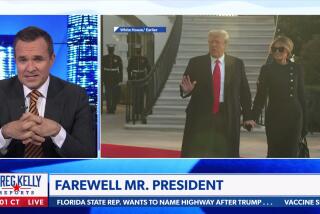No Longer a Monopoly, French TV Is Uneasy Mix of Public and Private
PARIS — At the end of the summer vacation season of 1963, President Charles de Gaulle grew more and more irritated by all the depressing images on French television of vacationers heading home during a downpour.
The heavy rains snarled traffic, destroyed crops in farms along the roads for all to see and darkened everyone’s mood. In interviews, people fretted about the higher food prices that they expected as soon as they reached home.
France had only one national television channel then, and it was owned and run by the government. De Gaulle fired off a memo to the boss of the station, Minister of Information Alain Peyrefitte, and ordered “a real cleanup of personnel.”
“This magnificent instrument for uplifting the public spirit should not be used to poison it,” De Gaulle said about television.
New Legislation
No French politician or civil servant has the same kind of power over French television any more. Yet it has taken more than 20 years since that example of De Gaulle’s highhandedness for the government to shed its monopoly over television, and only now, after passage of new legislation in August, is its dominance threatened by private television.
Moreover, old attitudes die hard. Even Premier Jacques Chirac, the conservative politician who has done the most to weaken the government’s hold on television, could not resist denouncing public television journalists a few months ago for what he described as distortion of the news.
“I wouldn’t want the government to be forced to use the procedure of daily official declarations on television to correct excessive or distorted commentaries,” Chirac warned. “That would be an absurd little war.”
Minister of Culture Francois Leotard, the Cabinet member responsible for television, added in another warning to the journalists, “You cannot hide behind public service to do partisan work.”
Channel Sale Expected
In what may or may not have been a coincidence, Chirac then decided that the TF1 channel, whose news reports offended him the most, would be the government channel sold to private business.
The sale of the government channel, expected early next year, should make it clearer than ever before that French television bears little resemblance today to what it was under De Gaulle. But the sale will still leave the future of French television rather confused.
The new law, while authorizing the sale of one of the three government television channels, also cancels the contracts of the owners of two existing private channels and offers them for sale as well. To complicate matters more, Socialists are challenging the law before the French Constitutional Council, which acts as a kind of Supreme Court on constitutional issues.
On top of this, no one is sure how television will change under the French government’s elaborate plans to bring cable television to millions of homes and to beam television by special satellite to all parts of Europe.
‘Audience Dictatorship’
But critics express the fear that the government, instead of striking a balance between public and commercial television, will ensure a dominant place for the latter.
“Commercial television will impose its law very quickly,” said Jack Lang, Socialist member of Parliament and former minister of culture. “Programming will be set by a dictatorship of the audience and of established stars that will leave no room for new talents, for new adventures in creation.”
For years, while they were out of power, the Socialists complained of government interference in television and promised to break the monopoly if elected. The most blatant example of the heavy hand of French right-wing governments was the dismissal of more than 60 journalists in retaliation for their protest against public television’s near-blackout of the student riots on the streets of Paris in 1968.
But, once in power in 1981, the Socialist government of President Francois Mitterrand turned out to be just as political as its predecessors. Officials dismissed directors, news editors and news show anchors as too conservative for new leftist tastes.
Mitterrand finally broke the government monopoly at the end of last year--just a few months before his Socialist Party lost control of the National Assembly to Chirac and other conservatives--by awarding contracts to private companies to create two new channels, one for rock music, the other for regular programming.
But angry critics denounced the contracts as rewards to old leftist friends.
Channel 5, the private channel for regular programming, aroused the most controversy. Its owners were Italian industrialist Silvio Berlusconi and French businessmen close to Mitterrand and the Socialist Party.
Many French were incensed at the involvement of Berlusconi, a Socialist who is scorned by intellectuals throughout Europe for creating a private Italian television system that, although immensely popular, is widely regarded as mediocre. He was derided as “the pope of tele-pizzeria” in the French press.
Although gaining somewhat in popularity in recent months, Channel 5 has never been able to weaken the hold of the three government channels on the French public. In fact, Channel 5, with its incessant variety shows and movies chopped up by commercials, probably succeeded only in making many French suspicious of private television.
The commercial interruption of movies upset French audiences grown used to seeing movies intact on public television. A recent poll showed that an overwhelming majority was hostile to commercial interruptions.
The movie industry itself is even more hostile. At the annual Cesar awards night in Paris last February--the French equivalent of the American Academy Awards--Robert Enrico, the president of the French Academy of Cinema Arts and Techniques, proclaimed his “protest against the mutilation of our films” on the commercial channel.
To drive home the point, the organizers of the awards program, which was shown nationally on public television, projected a classic French movie with stars Jean Gabin and Michele Morgan and deliberately interrupted every suspenseful moment with a commercial.
Yet, despite polls showing that most French do not want one of the government television channels sold, Chirac plans to go ahead with the sale. Holding back would weaken the image that he is trying to project of an active leader who fulfills his campaign promises quickly. Parliament was kept in an unusual summer session until it finally passed the television legislation in August.
As soon as the vote was in, ending the special session, Andre Rossinot, Chirac’s minister of parliamentary affairs, told the press, “We have fulfilled our contract.”
Many leftists suspect that the main purchaser of TF1 will be Robert Hersant, the controversial and conservative publisher and member of Parliament who controls almost 30% of the press of France, including France-Soir, the Paris newspaper with the largest circulation, and Le Figaro, the country’s most influential right-wing newspaper.
In their request that the Constitutional Council declare parts of the legislation unconstitutional, the Socialists focused their attack on the sale of the government channel, insisting that there were no safeguards in the legislation to prevent a private businessman from controlling a dangerously high percentage of the media.
Semi-Public Pay-TV
If the government channel is sold, the French television system will consist of two government channels, three private channels and a pay-television channel that is usually classified as semi-public since it is controlled by a huge advertising and publicity agency that is itself controlled by the government.
The Chirac government is going ahead with the ambitious plans of previous governments to provide cable access to half the homes in France by the year 2000 with optical fiber at a cost of $6 billion and to launch a satellite that could telecast five channels throughout Europe. If successful, these programs would probably change the face of French television far more than the recent break in the government monopoly and the impending sale of TF1.
No matter what the distant future holds for French television, there is one certainty--more commercials in the near future. With government channels limited to no more than 24 minutes of advertising a day, France, the fourth industrial power in the West, ranks only 15th in the percentage of its advertising revenue devoted to television.
That is sure to change. The private channels will need the commercials to survive, and the government channels, which depend mostly on television license fees collected by the government, will probably need more commercials to compete.
More to Read
Sign up for Essential California
The most important California stories and recommendations in your inbox every morning.
You may occasionally receive promotional content from the Los Angeles Times.










